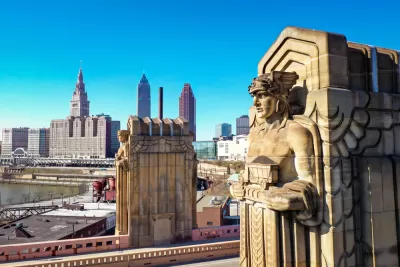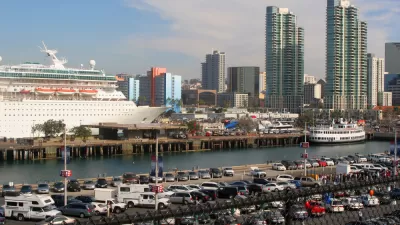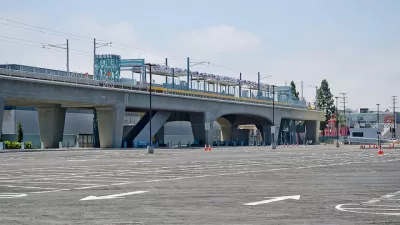Transit oriented parking reform has arrived in Cleveland.

Cleveland is the latest U.S. city to join the parking reform movement, by removing minimum parking requirements for new development located within a quarter mile of transit stops with bus or train service every 15 minutes.
“Currently, owners of new projects must build off-street parking or obtain a zoning variance, city planner Matt Moss told Signal Cleveland. City code requires one parking space per new housing unit. Businesses’ parking mandates are tied to square footage and the number of employees,” reports Nick Castele.
“Under the new scheme, developers would skip the parking requirement and instead invest in other forms of transportation – such as bike parking, transit passes for tenants or pro-pedestrian streetscape improvements. Cleveland’s City Planning Commission would review developers’ proposals,” adds Castele.
According to Castele, the parking reforms are part of Cleveland Mayor Justin Bibb’s push for a 15-minute city approach to transportation and land use, prioritizing transit oriented development and walkability over automobile dependency and car-centric planning and land use patterns.
Cleveland Planning Director Joyce Pan Huang is also cited in the article, describing how parking requirements have contributed to sprawl.
FULL STORY: Cleveland to scrap parking requirements near frequent public transit stops

Planetizen Federal Action Tracker
A weekly monitor of how Trump’s orders and actions are impacting planners and planning in America.

Congressman Proposes Bill to Rename DC Metro “Trump Train”
The Make Autorail Great Again Act would withhold federal funding to the system until the Washington Metropolitan Area Transit Authority (WMATA), rebrands as the Washington Metropolitan Authority for Greater Access (WMAGA).

DARTSpace Platform Streamlines Dallas TOD Application Process
The Dallas transit agency hopes a shorter permitting timeline will boost transit-oriented development around rail stations.

Parks: Essential Community Infrastructure — and a Smart Investment
Even during times of budget constraint, continued investment in parks is critical, as they provide proven benefits to public health, safety, climate resilience, and community well-being — particularly for under-resourced communities.

Porches, Pets, and the People We Grow Old With
Neighborhood connections and animal companions matter to aging with dignity, and how we build can support them. Here’s a human-scale proposal for aging in place.

Single-Stair Design Contest Envisions Human-Scale Buildings
Single-stair building construction is having a resurgence in the United States, where, for the last several decades, zoning codes have required more than one staircase in multi-story housing developments.
Urban Design for Planners 1: Software Tools
This six-course series explores essential urban design concepts using open source software and equips planners with the tools they need to participate fully in the urban design process.
Planning for Universal Design
Learn the tools for implementing Universal Design in planning regulations.
City of Charlotte
Municipality of Princeton
City of Camden Redevelopment Agency
City of Astoria
Transportation Research & Education Center (TREC) at Portland State University
US High Speed Rail Association
City of Camden Redevelopment Agency
Municipality of Princeton (NJ)





























